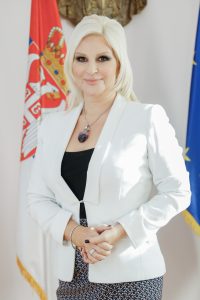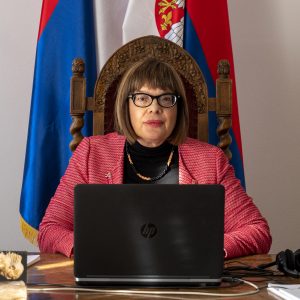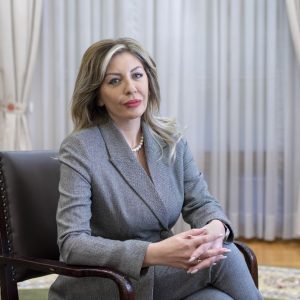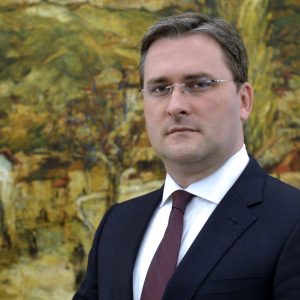What we can all do together to make Serbia a better place to live

When we stepped onto the Serbian media scene five years ago, we created and designed Diplomacy&Commerce magazine to be the premier current affairs magazine, providing high-quality coverage and analysis of news and events in Serbia and the region. According to the reactions of all the people with whom we have been cooperating, we think that we have succeeded in that, and that blazes our future trail.
The year behind us was marked by the greatest global challenge that our generation has seen. The Covid-19 pandemic has viciously demonstrated how vulnerable we are, what the limits of the state’s ability are and the limits of people’s trust and fear. It seems that times have never been tougher. This March, Diplomacy&Commerce is entering into its sixth year of existence and celebrates its fifth birthday. We have tried to become and remain everything we wanted to be from the first day – a reliable platform for communication between our partners, that is embassies, business associations, institutions, companies, civil society organizations, media representatives, cultural, artistic and public scene of Serbia.
In this birthday issue, we bring you stories, opinions, analyses and forecasts from the Serbian authorities, diplomatic corps, international institutions, business associations, media and many others. We spoke with them about important topics: how well Serbia has been coping with the crisis when the pandemic ends one day, reforms and improving the economic environment, as well as attracting more foreign direct investments, further development of Serbia on its road to the EU, bilateral and economic cooperation, investments in society, culture and media and what we can all do together to make Serbia a better place to live.
1.We entered the New Year with an extended reach of the COVID-19 pandemic that is still ongoing. What are your ministry’s plans in 2021? Do you think that Serbia will manage to cope with the crisis this year and what results is it going to achieve in terms of GDP and economic growth?
2.Given that the continuation of the process of opening chapters during the European accession process has been announced, what awaits Serbia on its path to the EU membership and what reforms should the country implement this year (i.e. which segments are priorities)?

We expect to see new investments in mining sector
1. The year 2020 was probably the most challenging year in our recent memory, not only in Serbia but the world too. Just like in the rest of the world, the main task of our state was, on the one hand, to fight the COVID-19 pandemic, in order to preserve the health and lives of our citizens, and on the other, to save our economy. That fight is not over, neither in the health, nor in the economic sense, because we are still recovering from all the consequences of the pandemic, which will be neither easy nor simple. How long the recovery will last depends only on us, on our work, energy, courage and commitment, and above all, on implementing reforms and creating an environment for new investments, while accelerating existing ones.
Accordingly, the activities of the Ministry of Mining and Energy are moving in three main directions: preparing a new legal framework, reforming public companies and creating conditions for increasing investments in the energy sector. These activities will be our focus this year.
We have also prepared amendments to the Law on Mining and Geological Research, aiming at having faster and more efficient procedures, better protection of mineral raw materials and generating higher revenues for the state. Thanks to these changes, we expect to see new investments in mining and increase the share of this sector in the national GDP from the current 1.9% to between 3.5 and 4% in three years. We are changing the energy law as an umbrella law and introducing electronic procedures for issuing acts which come under the Ministry’s jurisdiction. With the new law on energy efficiency, we want to raise this segment to the level of a national project, and establish the Energy Efficiency Directorate which will finance both individuals and companies that want to reduce energy consumption. For the first time, we are passing a special law on renewable energy sources which introduces auctions as a model of incentives, and through boosting competition between producers, we will reduce the burden on our citizens and businesses.
Furthermore, we will be introducing the concept of buyer-producer for the first time because we want to see solar panels on the roofs of houses, buildings and production halls throughout Serbia, which individuals and companies will use to produce electricity for themselves, and thus achieve savings or return excess energy to suppliers. The drafted laws will enable energy and mining permits to be issued digitally, i.e. we are introducing e-mining and e-energy, following the example of e-permits in construction.
Our priority in 2021 will also be reforming public companies, namely implementing reorganization plans in public enterprises Srbijagas and Elektroprivreda Srbije (EPS), which the Government has adopted, the implementation of which will enable transparent and much more efficient operation of these companies. Following the government decrees from December 2020, the real and formal complete separation of Elektroprivreda Srbije and the distribution system operator was carried out, while at Srbijagas, a complete separation of the dependent companies of Srbijagas, which are engaged in gas transport and distribution, has yet to be implemented.
With the new legal framework, we expect to see more investments in the energy sector very soon. New investments are needed in the field of renewable energy sources (RES), but much more investments are needed in the electricity and gas sectors.
Total investments in the segment of energy, both current and planned, amount to more than 10 billion euro. Faster realization of investments and regional energy connections are important for us in order to be energy safe and for Serbia to be able to use its potential as a transit energy corridor as it is already in traffic.
2.Everything that the Ministry of Mining and Energy has done so far – from drafting new laws that are harmonized with European directives, through better and more transparent functioning of the energy sector and to building energy infrastructure to better connect with the neighboring countries – has been done keeping in mind our obligations as members of the Energy Community and our country’s road to the EU membership.
The laws we have prepared are not only an improvement over the existing legal solutions, but will also lay the foundation for a new energy policy, fitting Serbia’s expectations, and that is increasing energy security through greater investments in energy efficiency and RES, namely the diversification of directions and sources of gas supply, but also energy transition and turning to climate-neutral development and having a much greater concern for environmental protection.
In terms of electricity production, the Trans-Balkan Electricity Transmission Corridor is currently being built as a project of regional importance, significant for the energy market of the entire region. In the gas sector, this year we will begin the construction of the Niš-Dimitrovgrad gas interconnection, which will enable not only the diversification of routes, but also the diversification of natural gas suppliers.
Also, with the adoption of the reorganization plan for Srbijagas, we started to eliminate the current problem in the gas sector whereby Serbia has not been fulfilling its international obligations to the Energy Community due to the arbitrariness of individuals in Srbijagas, which is the main obstacle to opening Chapter 15 in the EU accession negotiations.
As a result of everything that the Ministry is doing, I expect that the Serbian energy sector and the overall direction of Serbian energy will be much more in line with the key changes taking place in the EU, concerning decarbonization, climate neutral development and green energy as the backbone of Serbia’s energy security in the future. All these goals will be specified in the 2030 National Plan for Energy and Climate, as well as in the new 2050 Energy Strategy, with the vision that, by 2050, Serbia would have generated at least 50 percent of energy from renewable sources.

This year we have a bigger culture budget
1. Our country has reacted very well in the face of the pandemic, and the vaccination process is progressing extremely good, putting Serbia among the most successful countries in Europe and the world in regard to inoculation. This is quite encouraging given that, thanks to vaccination, we will be able to successfully deal with the coronavirus and that our economy will continue to grow stronger, as will all segments of our society, including those most affected. Culture has been one of the biggest victims of the pandemic in our country, as well as worldwide. We should note that, as soon as the first prerequisites were met, the anti-pandemic measures pertaining to cultural institutions were relaxed. We gave stage artists and artists who work indoors to have a priority status during vaccination, and we hope that this will help culture to return to normal in the foreseeable future. This year we have a bigger culture budget. I would especially like to single out the project called “Cities in Focus”, for which we have allocated 349.5 million dinars, the biggest amount a project got since the launch of the competition and which is three times more money than last year. We will try to help build infrastructure in cities and municipalities, and those are some of our activities on decentralizing culture. To that end, we are launching a completely new project, “Capital of Culture of Serbia”, following the example of the European Capital of Culture.
We will launch a competition in which all cities can participate except Belgrade and Novi Sad, and by the end of this year, we will have chosen a town that will take this title in 2023. Next year, we will invest substantial funds in the construction of cultural facilities in that town. At the same time, we identified 20 points that are our strategic priority and marked them as very important in order to improve the state of culture in Serbia. We are going to focus on large infrastructure investments. We have also signed an agreement with Council of Europe Development Bank, which will help with the launch of large-scale infrastructure projects. This includes, among other things, the relocation of the Nikola Tesla Museum to the building that used to house the Power and Light thermal power plant. This will be a big project in the future. The relocation of the History Museum of Serbia to the building that housed the Central Railway Station on Savski Square is underway. After 57 years, that is, since its founding, the Museum will finally have an adequate space in which to store and exhibit artwork and historical artifacts that are important for our history.
2. The European integration process is Serbia’s foreign policy priority which our country is dedicated to. This has been validated in the context of recent crises, such as the migrant crisis and the crisis caused by the COVID-19 pandemic. Serbia has shown responsibility, seriousness and the ability to make a full contribution to overcoming these problems. At the same time, in terms of economic development and reforms, Serbia has been seriously continuing its activities in these segments, even at a time when the entire continent is facing serious consequences caused by the pandemic. I would also like to underline that we are implementing development and reform processes not only to join the European Union, but above all in the best interest of our society and its strengthening, as well as for the purpose raising the living standard of our population and protecting their best interests. Serbia is determined to improve all areas of our society on its path to EU membership, and the very dynamics of that path does not depend exclusively on us and our readiness, but also on our European partners to a large extent.
In regard to culture, we will continue to work on improving all of its segments through improved laws that we have been working on. We have already drafted the Law on Museum Activities, which will soon be discussed by the MPs in the National Assembly. For the first time, this area is regulated in a more detailed way via a special law. The Draft Law on Inspection Supervision has also been completed, as well as amendments to the Law on Culture. In terms of the information segment, through implementing an Action Plan on the realization of the Media Strategy, we will work on amending the law that will further improve this area. At the same time, the Working Group for Safety and Protection of Journalists will work on improving the safety of journalists by ensuring an even more efficient reaction of the authorities in case of security threats. As for the other activities of the Working Group, I would like to single out the launch an emergency phone line to which journalists can report threats made to their security.

Our goal is to expedite the process of European integration
1. First and foremost, we are waiting for the European Commission to present a detailed plan for the implementation of the new methodology for EU accession negotiations by early March. We are working on its content with European partners because it is in the common interest for the new form of negotiations to become an effective EU instrument for monitoring the implementation of reforms in our country, but also for expediting the process of European integration.
In terms of EU grants, we are in a very dynamic period. In parallel with the preparation of proposals for financing projects from IPA III funds, we have prepared and nominated proposals for infrastructure projects to be financed from the EU Economic and Investment Plan for the Western Balkans, in order to provide non-refundable support from the EU and other development partners amounting to over 300 million euro. The majority of the projects – seven of the proposed twelve – were assessed as mature and strategically relevant, and thus ready for funding. The goal is to finance sustainable economic development in Serbia from these funds, primarily projects pertaining to railway development, sustainable supply and transmission of electricity, environmental protection by improving the wastewater and solid waste management system, as well as the competitiveness of the economy, small and medium-sized enterprises and their inclusion in international economic flows.
2. The new format of accession negotiations implies negotiations of 6 clusters within which related chapters are grouped. Serbia is already heavily involved in cluster reform processes, because our regulations have been harmonized with the EU Acquis for years in all the areas covered. The content of the cluster is mutually important for both Serbia and the EU, because it refers to the implementation of economic and infrastructural reforms following the highest European standards, as well as the implementation of the investment plan for the Western Balkans. The first cluster of fundamental rights is especially important – primarily the rule of law – which progress will be a key measure for the dynamics of the entire membership negotiations. Another important novelty is additionally accentuated political responsibility of both sides (Serbia and the EU), in the negotiations with the view of making this harmonization faster and complete, and for the EU to credibly valorize progress through stronger dynamics of the accession process.

We are in charge of numerous capital infrastructure projects
1. We are in charge of numerous capital infrastructure projects, from the realization of the Belgrade-Budapest high-speed railway, a dozen highways and high-speed roads throughout Serbia, through the construction of a sewerage network and wastewater treatment plants, to the beginning of the Belgrade Metro project. We have huge tasks ahead of us, the realization of which is crucial in ensuring stable GDP growth and positive balance of our economy. Serbian Government has achieved historic results in the fight against COVID pandemic and made it possible for the citizens of Serbia to have access to as many as four vaccines, which is one of the best examples of responsible state administration in Europe and worldwide.
2. Reforms in the area of the rule of law are of crucial importance, and I think that the Government of Serbia has shown through its cooperation with the EU institutions that it is on a good path to continue improving in this area. In addition to the rule of law, there are the areas of economy and environmental protection, where we have launched projects that will contribute to ensuring a ‘sustainable future’ at an incredibly large scale. In the agenda of the President Vučić and the current government, one of the main places is given to the massive project of construction of utility infrastructure and waste disposal infrastructure, included in the program Serbia 2020-2025. In order to finally solve accumulated problems in this sector, we signed a contract with the Chinese construction corporation CRBC, which enabled the design and construction of wastewater treatment plants, sewerage network and pumping stations in 65 local self-government units at 73 locations, as well as rehabilitation or construction of regional landfills at six locations.

Popularizing Domestic Tourism
1. In 2020, Serbia was one of the countries that responded best to the crisis. We expect that, first of all, health, and then the economic situation this year will be much better, and that Serbia will succeed in achieving sustainable growth of economic activity. The key reason for optimism lies in the fact that Serbia, thanks to the adopted measures of the government, managed to preserve production capacities and jobs. In terms of economic growth, the retail sales must return to the pre-crisis level last year. The tourism sector will try to minimize the damage through having a significant number of domestic tourists this year too, so our Ministry’s activities will be primarily aimed at popularizing domestic tourism among Serbian tourists, building tourist infrastructure and preparing for foreign guests when all the relevant conditions are met.
2. Serbia is strongly committed to the European integration process and our Ministry has been working hard on opening negotiation chapters that come under our jurisdiction. This year, we need to adopt the Law on Services. One of the most important provisions of this law is the establishment of a single contact point, a place where all service providers and users will be able to get all necessary information to launch and provide certain services and complete all procedures online. Concerning consumer protection, Serbia has already made a huge step forward, and the passing of a new law is expected in the coming period, which will facilitate significant progress, especially in the segment of out-of-court settlement of consumer disputes. An Action Plan has been prepared for Chapter 30 and is expected to be harmonized with the EU by the end of this year or early next year.

Serbian government will continue to focus on comprehensive reforms
1. I can confidently say that Serbia has faced its health challenges better than many wealthier and more developed countries in Europe and the world. In addition to investing in health care infrastructure and opening COVID hospitals, the Serbian government has implemented a number of economic measures. Serbia has been vaccinating its population in the fight against COVID-19 for over a month, and according to the number of vaccinations per million inhabitants, our country ranks second in Europe while according to the number of revaccinations per million inhabitants, we rank first in Europe, as well as fifth in the world in terms of the number of vaccinated people per 100,000 inhabitants. Our health workers have never left our focus, and only in the last year, their salaries have been increased by about 30 percent. Also, starting with January 1 this year, health workers will receive another salary increase of five percent. Despite great challenges, Serbia recorded a GDP decline of only one percent in 2020, which was the best economic result in Europe. I should also mention that the Government of Serbia has recently adopted a new, third package of economic aid measures worth 249 billion dinars, whereas the total value of all three aid packages is 953 billion dinars, or approximately 8 billion euro. Our country has received praise from the IMF, World Bank and other institutions for the current economic measures to mitigate the consequences of COVID-19, all of which has demonstrated that we are a strong and stable state and that citizens and businesses can count on us in the most difficult moments.
2. Serbian government will continue to focus on comprehensive reforms, although the achieved progress has not been accompanied by the appropriate dynamics of opening new accession chapters. As you know, Serbia is currently ready to open five chapters for which it has submitted negotiating positions, and in order to improve and expedite the accession process, Serbia has accepted the new methodology. We are also grateful to the EU for the support in the field of structural reforms and economic measures, as well as for the investments. We would like to call on the EU to continue implementing the EU Economic and Investment Plan for the Western Balkans, which will encourage further economic growth. We will do everything in our power to speed up our activities relating to the EU membership, but not everything depends only on us.